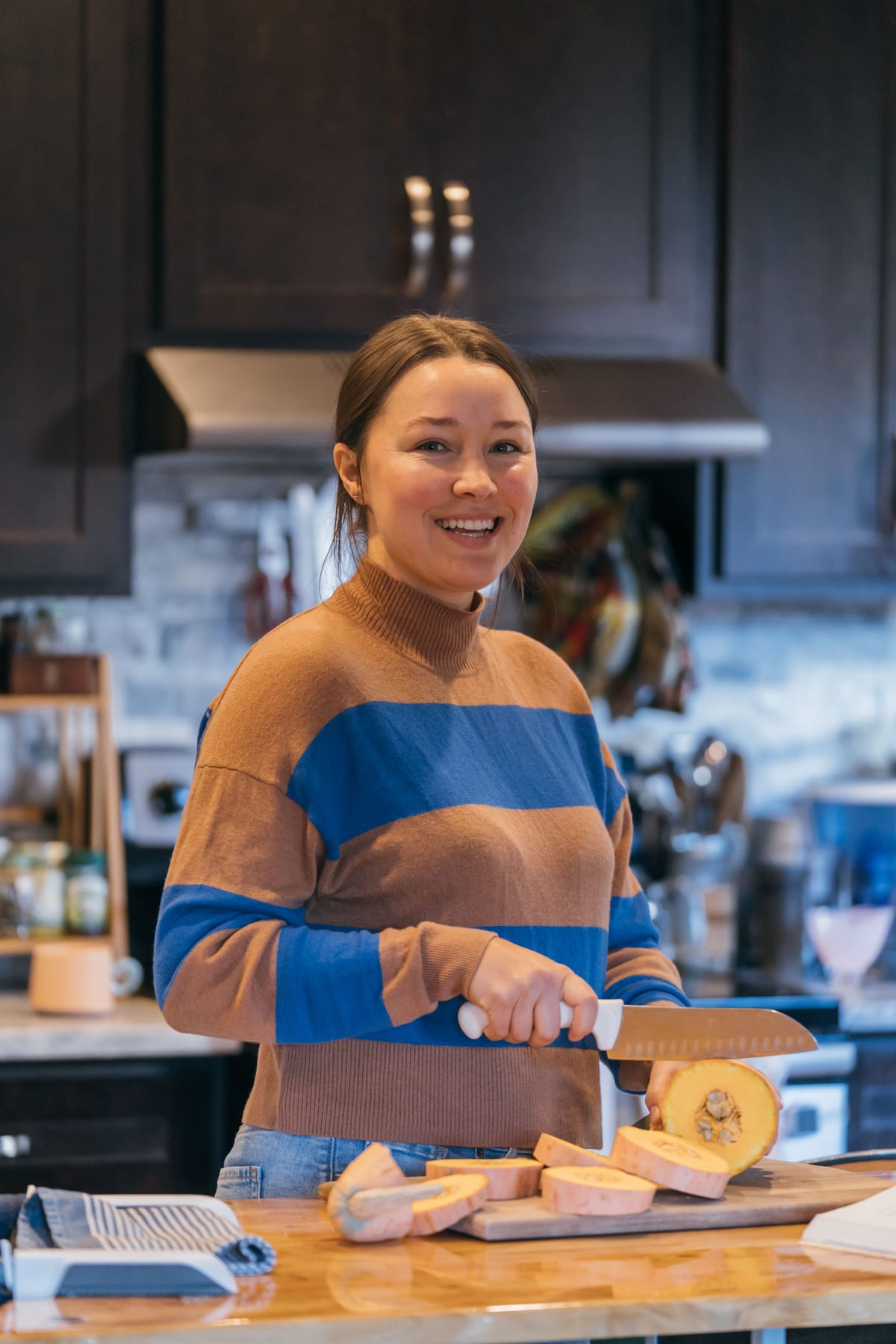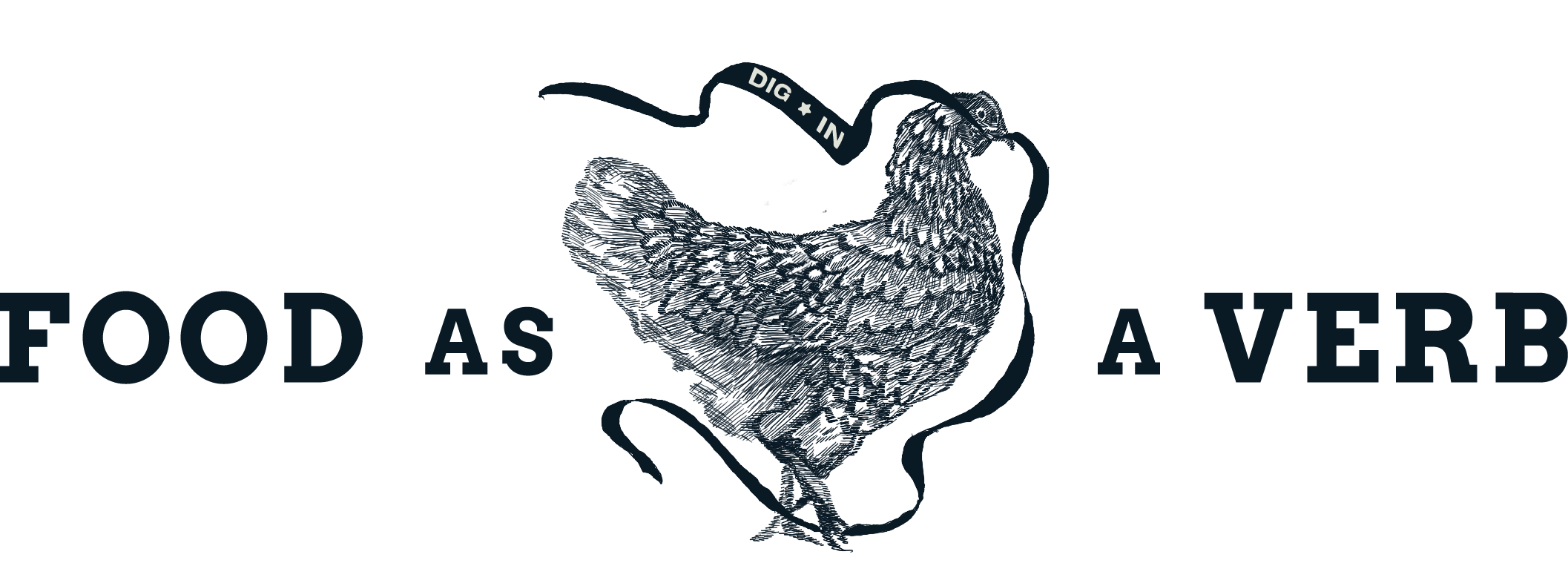For 2024, here's a diet that doesn't feel like one
Local nutritionist Hannah Wright teaches health, confidence and intuitive trust while avoiding fear, guilt and shame. What a rare gift that is.

"You don't have to be perfect."
Here's a little experiment: see how long you can go without commenting on another person's body.
Or your own.
Withhold all spoken judgments, suggestions, comparisons or descriptions. In conversations and texts. Positive or negative.
Let bodies exist free from commentary.
Often, I'll offer this experiment to my students; we find it's staggeringly impossible. Bodies – ours and others – seem to be the focus of so much criticism, measuring up, tearing down.
Externally.
And internally.
A lot of this is cultural; much of this is media-influenced; some of it rooted in that one comment from 7th grade that still burns today. Consider how frequently we see the portrayal of bodies – size, shape, ability, color, sexuality – in all the media we encounter.
It is everywhere.
No wonder we can have distorted relationships with food, diets and health.
Every new year, we resolve to lose weight and diet.
Yet how can we accurately make resolutions when our perceptions of body shape and health are often defined by corporations and media?
Especially a sexualized media targeting female 'beauty'?
“A culture fixated on female thinness is not an obsession about female beauty, but an obsession about female obedience," Naomi Wolf declared in her famous The Beauty Myth. "Dieting is the most potent political sedative in women’s history; a quietly mad population is a tractable one.”
Men, too, face similar beauty standards. Our arms must be jacked, abs must be six-packed, with weakness avoided at all costs.
"The ideal man – the peak of male beauty we demand others conform to – falls in line with the tropes of hypermasculinity and traditional gender roles," writes Harris O'Malley in The New (and Impossible) Standards of Male Beauty. "
So, when we find someone who can speak to us authentically and wisely about health, bodies and what really counts as wellbeing, we quickly realize:
How rare and precious that is.
During COVID, Hannah Wright began posting Instagram videos about diet and nutrition.
That's good. Hannah, 37, is wise, grounded and has a keen and trained ear for discerning diet and nutrition truth from snake oily, exploitative motivations.
"I never want anyone to feel guilt or shame," she said. "It can scare us. It hurts us. I don't like to use fear to motivate anyone."

Today, she's the owner of Eat Well Be Well Nutritional Therapy in Chattanooga; she offers group courses for women, self-paced online courses and resources and a consistent social media presence.
She possesses a lovingly keen no-bullshit detector that sweeps past all the distorted, unwholesome messages about health and diet. Her posts are never gussied up; she's a normal working mom posting from her own kitchen and life.

But in the beginning – back in COVID days – she got slightly duped. (Who didn't, right?)
Social media has a bewitching quality to it; to rise to the top, we often fake or fictionalize our experiences. During COVID, when Hannah began posting short episodes on nutrition, she felt that tickling urge:
I need this to look good.
She went to Ace and bought a new kitchen. Or, at least, one-square foot of it.
"A slab. A marble slab," she said. "I bought it at Ace. One square foot."
Shooting videos, she positioned the slab so that it appeared her kitchen had a marble countertop. Here's a post on chickpeas and rice from 2020.

See the marble?
The slab was sitting on top of her regular countertop which, to be fair, was old and yellow, soon to be remodeled. (Today, she's got a pretty damn cool countertop, shaped like the state of Tennessee, handmade by her husband.)

As she posted with the marble-kitchen-that-wasn't-really-her-kitchen, it didn't take long for Hannah to realize:
That's not my kitchen. Why am I doing this? This is kind of bullshit. Why am I doing this?
So, she scrapped the marble slab (putting it outside her home, where it remains today) and began producing genuine, this-is-me videos.
I love this slab-story; it reveals how down-to-earth Hannah is and how easy it is to fall into the illusion of health-as-image.
"I don't want people to think they have to do this," she said. "It felt really forced. I wasn't being myself."
Today, she's posting in an entirely new, slab-less way. Her social feed is authentic, fun, goofy at times, and consistently encouraging and informative.
Hannah – also a mom, wife, copywriter and former Chattanooga Roller Derby girl (pivot + blocker) – bravely normalizes the ordinary; dancing in her kitchen, laughing, posting with a "tired mom face." All within a relaxed home with kicked-off shoes and toys and stacks of books and coffee-cups yet to be rinsed out on top of a marble-less countertop.





Hannah Wright, Eat Well Be Well, Chattanooga, Tennessee
Her Instagram is a relaxed library of casual yet confident posts"kindly cutting through the BS to help you fix your gut & hormones."
See for yourself:
- Gut-health swaps
- Holiday bloating and how to prevent it
- Face-filters, wisely shopping at Aldi, easily adding fiber to your breakfast and being a mom.
Today, she has 13,000 followers.

Food as a Verb proudly thanks Easy Bistro & Bar, our sustaining partner, for its generous support.
Thanks to two-time James-Beard nominee Erik Niel, Easy Bistro & Bar offers unparalleled and deeply thoughtful dining in the heart of West Village.
"I seemed to do well when I started trying to be more me," she said. "Videos where I was just talking to friends, not trying to force a persona. That's not who I am."
She's trained as a nutritional therapy practitioner with a masters' degree in human nutrition and functional medicine.
She posts with presence, kindness and an empowering confidence appropriate to everyone, regardless of circumstances, identity or income.
She knows firsthand.
"Eating well is a privilege. But there are ways to eat well on a budget," she continued. "I try to teach people do the best you can do. Don't feel guilty or worried if you can't buy all organic or always shop local. It can become really overwhelming."
Wright grew up on East 43rd St. in Chattanooga with parents who taught her the importance of healthy food and nutrition. (Her dad, Rick Wright, was an influential chef at Girls Preparatory School + Sewanee: University of the South.)
"We ate very simply and economically, mostly things like beans and rice, potatoes, eggs, canned tuna, and noodles with marinara. My mom almost always had a little garden, so I remember having tomatoes in the summer," she said.
"We didn't have much. I became fascinated with food because we didn't have great access to it. I enjoyed daydreaming about elaborate banquets and feasts."
After college, she began working at a mental health facility in Oregon. Watching closely the way residents' diet seemed to affect their responsiveness, she got curious: how are nutrient deficiencies connected to mental illness?
"Nutrients and food as medicine," she likes to say.
Professionally and personally, Hannah began to carve out her own true definition of health.
"As a definition? It's the absence of disease. But I think it's more than that. You don't have to be sick with a diagnosable disease to have poor health," she said. "Everybody attributes it to eating, but there is more to it. Like community, support, interpersonal relationships and activity level. Your mindset affects your health so much."
Food as a Verb is proud to announce a five-part series with Hannah called Build Your Plate.
Over the coming winter and spring, she'll focus on the connections between "food, our nervous system, stress, the environment, relationships, sleep."
Look for the first Build Your Plate in late January or early February. To sign up for Hannah's upcoming group class, visit her website.
No fear, no guilt, no shame.
"You don't have to be perfect. You’re smart enough to understand this stuff," she tells people. "With all the fear-mongering, headline-grabbing stuff you get overwhelmed. I try to do the opposite."

All photography by Julie Ellison.
All words by David Cook. This story is 100% human generated; no AI chatbot was used in the creation of this content.
All design by Alex DeHart.
Story ideas, questions, feedback? Interested in sponsorship or advertising opportunities? Email us: david@foodasaverb.com and sarah@foodasaverb.com.
Food as a Verb thanks our sustaining partners for their generous support.






Niedlov's Bakery & Cafe, a Main St. anchor, has elevated our city's bakery experience to beautiful levels while strengthening community in immeasurable ways. Society of Work is a shared coworking space designed with business flexibility in mind and the resources to help like-minded people connect and create amazing things together. From private offices to 24/7 coworking memberships, we provide the space you need to get work done. The Chattanooga Area Food Bank believes that no one should go hungry, and through our network of over 250 hunger-relief partners, we provide equitable access to food and resources to end hunger today and build pathways for a healthy, hunger-free future tomorrow. For more than 25 years, Lupi's has served locally-sourced, creatively made and award-winningly delicious pizza pies from five nearby locations. Tucker Build offers Chattanooga a commercial construction firm made up of design-build experts specializing in the planning, building and managing process. Female-and-locally owned, Divine Goods offers beautifully curated gifts for every occasion. Be divine and send someone special a Divine Goods gift - locally sourced when possible, and always thoughtful.
